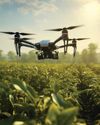
According to reports, 1.6 billion tons of food are lost or wasted every year, equating to a total value of $1.2 trillion being wiped from the supply chain. With one-third of the total amount of food produced globally being misused, the industry needs to look towards innovation and digitalization to combat this ever-growing trend.
Through embracing technology and digitalizing the food supply chain, a move can be made towards reducing the amount of food waste and loss within the industry. Not only that, but it can also help ensure there’s enough resource to sustainably support the future global population.
With the UN’s Sustainable Development Goals setting a target of halving food loss and waste by 2030, Ian looked at how the digitalization of the supply chain could help decrease global food waste.
THE NEED FOR INNOVATION TO REDUCE WASTE
Although food waste is evident across the entire supply chain, the vast majority comes at the very beginning (during production) and at the very end (during consumption). The former of these is more common within developing countries, where the infrastructure is of a poor standard and cannot handle the food thus creating waste, whilst the latter is more pronounced in developed countries with waste being caused by both retailers and consumers.
According to the Boston Consultancy Group (BCG), the amount of food waste created in the supply chain is set to rise 1.9 per cent from 2015 to 2030. You may think this is a small rise, but when put into perspective with the current 1.6 billion tons wasted every year, this figure will increase by 30.4 million tons.
This story is from the {{IssueName}} edition of {{MagazineName}}.
Start your 7-day Magzter GOLD free trial to access thousands of curated premium stories, and 9,000+ magazines and newspapers.
Already a subscriber ? Sign In
This story is from the {{IssueName}} edition of {{MagazineName}}.
Start your 7-day Magzter GOLD free trial to access thousands of curated premium stories, and 9,000+ magazines and newspapers.
Already a subscriber? Sign In

Avocados: Health Benefits And Sustainable Cultivation
ATTRACTIVE GROWTH SEGMENT - In only a few years, the avocado has developed from being a rather a and has become an integral part of modern cuisine and in restaurants throughout Europe and beyond.

UFlex to Showcase Innovative and Sustainable Printing and Packaging solutions at DRUPA 2024
U Flex Limited, India's largest multinational flexible packaging and solutions company, is participating in DRUPA 2024, the premier global trade fair for print and packaging innovations, scheduled to take place in Dusseldorf, Germany from March 28 to June 7, 2024.

Hubergroup and Manroland Goss unite for Sustainable Packaging Innovation
Hubergroup, a global specialist in and chemicals, has partnered with manroland Goss web systems, a leading provider of web offset printing solutions, in a strategic collaboration.

Technological Advancements in the Premium Flavour, Extract and Concentrate Industry
Food Marketing & Technology Magazine had the privilege of hosting the fourth edition of their business webinar on “Technological Advancements in the Premium Flavour, Extract and Concentrate Industry” with Paul Ahn, Global Sales Manager, Flavourtech.

Flavourtech's Origins: From Wine to Worldwide Flavor Solutions
LEON SKALIOTIS, CEO of Flavourtech - Discover how Flavourtech, founded over 40 years ago by an innovative winemaker in Australia, evolved from addressing grape juice desulphiting to revolutionizing flavor extraction and concentration across various industries.

How CPG Companies Can Adopt Better Sustainable Packaging Practices in 2024
Sustainability has gone mainstream. With more switching to consumers environmentally friendly brands, it's become a central theme across all industries.

The Evolution of the Protein Value Chain Sustainable Protein Systems for a Growing World
As the world's population is on course to surpass ten billion by 2050, our food systems face the challenge of providing sustainable nutrition without further harming harming the planet. Animal-based diets and the reliance on animal-derived proteins are significant contributors to environmental degradation and public health issues. Not only is the global population increasing, but the expanding middle class in developing nations is driving a surge in protein demand, intensifying the strain on our environment.

Implementing the Technological Intelligence in Agricultural Produce
It is estimated that by 2050 the I world's population will be around 10 billion. From employment generation to contribution to National Income, agriculture is important to all of us as agricultural produce is the core on which we survive. It contributes a significant portion to the economic prosperity of the developed nations and plays an active part in the economy of the developing countries as well.

Cocoa Crises: A Sweet Industry's Bitter Challenge
As a pastry chef and entrepreneur running a small-scale baking business, I have always believed in the magic of cocoa. From the velvety richness of couverture chocolate to the deep, earthy notes of cocoa powder to the creamy allure of cocoa butter, these ingredients are the essence of our creations.

Ethylene Oxide (ETO) Detection in Ready-Made Spice Mixes: Ensuring Food Safety
INTRODUCTION - In the world of culinary delights, ready-made spice mixes hold a cherished place, adding convenience and flavour to countless dishes. However, recent concerns over food safety have brought to light the presence of ethylene oxide (ETO) in some of these products.